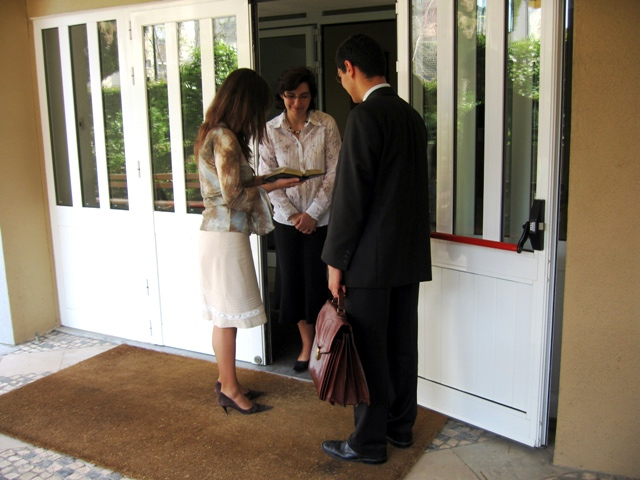In Largent v. Texas, 318 U.S. 418 (1943), the Supreme Court held that a Texas ordinance requiring a permit to solicit orders for books — in this case religious materials — was unconstitutional.
Largent was one of a series of cases the Court decided in 1943 extending protections for religious freedom.
Woman convicted of spreading religious tracts without a license in Paris, Texas
The mayor of Paris, Texas, could issue permits for selling books or other activities if he or she deemed it “proper or advisable” to do so. Because Mrs. Daisy Largent had neither applied for nor received such a permit, police in Paris arrested her for offering books for sale.
At the time she was cited Mrs. Largent was carrying a card of ordination from the Watchtower Bible and Tract Society, or Jehovah’s Witnesses. The society is dedicated to spreading its members’ religious faith through circulating books and pamphlets by house-to-house distribution. Witnesses offered these tracts and books to individuals and requested a donation, not to exceed 25 cents, to further the work of the society. If no donation was made, Mrs. Largent would still, consistent with the traditions of the society, offer to leave one or more pamphlets.
After Mrs. Largent was convicted by the corporation court for the municipality of Paris, she appealed to the County Court of Lamar County. That court heard the case de novo. It convicted her in a bench hearing and fined her $100.
Court said ordinance allowing mayor to decide distribution permits violated First Amendment
Because higher Texas courts did not permit appeals for fines of $100 or less, Largent appealed to the U.S. Supreme Court. The State of Texas did not appear at the Supreme Court hearing. The Court reversed the county court’s decision and issued a terse opinion, delivered by Justice Stanley F. Reed.
Reed argued that it was unnecessary to determine if the acceptance of donations represented the selling of pamphlets under the city ordinance. He chose instead to focus on how individuals could obtain permits.
The ordinance vested this sole power in the mayor, who had to decide whether it was “proper and advisable.” Reed called this approval by a government official “administrative censorship in its most extreme form.” Reed said it “abridges the freedom of religion, of the press and of speech guaranteed by the Fourteenth Amendment.”
Also in 1943 the Court in Jones v. City of Opelika, Martin v. City of Struthers, and Murdock v. Pennsylvania limited the ability of governments to regulate the distribution of religious literature on commercial grounds as unconstitutionally intrusive on religious practice.
This article was originally published in 2009. David A. May, PhD, is the interim president of Eastern Washington University. He taught at EWU from 1999-2016 on topics such as Supreme Court politics and public policy, jurisprudence, and judicial process.

